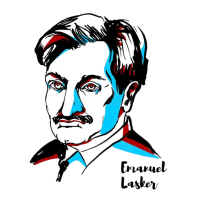
Emanuel Lasker: The Grandmaster of Chess and Psychology
11.01.2025 05:00 | HistoryOn January 11th, we commemorate the anniversary of the passing of Emanuel Lasker, one of the greatest chess players in history.
This German grandmaster was exceptional not only for his unparalleled skills on the chessboard but also for his intellectual depth and innovative approach to the game.
Biography
Emanuel Lasker was born on December 24, 1868, in the village of Berlinchen (now Barlinek, Poland) to a Jewish family. From an early age, he demonstrated exceptional talents in both mathematics and chess. He pursued studies at the University of Berlin, focusing on mathematics, and later earned a doctorate.
In 1894, Lasker became the second World Chess Champion by defeating Wilhelm Steinitz. He held this title for an unprecedented 27 years, a record that remains unbroken. His career was marked by numerous victories over the leading players of his time, including Siegbert Tarrasch, Frank Marshall, and Akiba Rubinstein.
Chess Style
Lasker was renowned for his psychological approach to chess. He often maneuvered his opponents into uncomfortable positions where they made mistakes without realizing it. His style was initially misunderstood, with some critics accusing him of "unorthodoxy." However, as Garry Kasparov later remarked, Lasker’s approach was genius, ahead of its time in many ways.
Intellectual Pursuits
Lasker was more than just a chess player. He was an accomplished mathematician and philosopher who published numerous works on logic, probability, and game theory. His book Common Sense in Chess (1896) remains a classic in chess literature. He also explored theater and writing during his lifetime.
Memories and Tributes
Jose Raúl Capablanca, who took the World Championship title from Lasker in 1921, said: "Lasker was not just a chess player. He was a thinker who made chess an art." Siegbert Tarrasch, a long-time rival, noted: "Lasker taught me that chess is not only logic but also psychology."A
lexander Alekhine, another chess legend, reflected: "Lasker had the ability to see not only what was on the board but also what was in his opponent’s mind. That made him unique."
Richard Réti wrote: "Lasker was a master not only of chess but of life. His adaptability and understanding of others inspired not just chess players but everyone who met him."
Exile and Final Years
With the rise of the Nazi regime, Lasker was forced to leave Germany. He first moved to the Soviet Union and later to the United States. Despite facing significant challenges, he remained active and continued to contribute to the chess world. He passed away on January 11, 1941, in New York City at the age of 72.
Legacy
Emanuel Lasker remains a legend in chess history. His unique approach to the game, blending mathematics and psychology, and his adaptability to different opponents’ styles have inspired generations of chess players. Today, we remember him not only as a chess player but as a man who enriched the world of intellect and art.
